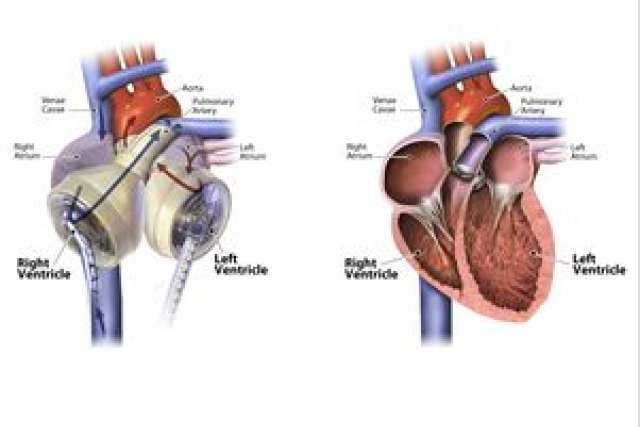A petite 44-year-old woman has received a successful heart transplant at Ronald Reagan UCLA Medical Center, thanks to an experimental Total Artificial Heart designed for smaller patients.
The UCLA patient is the first person in California to receive the smaller Total Artificial Heart, and the first patient in the world with the device to be bridged to a successful heart transplant — that is, to go from needing a transplant to receiving one.
The 50cc SynCardia temporary Total Artificial Heart is a smaller investigational version of the larger 70cc SynCardia heart, which was approved for use in people awaiting a transplant by the Federal Food and Drug Administration in 2004 and has been used by more than 1,440 patients worldwide.
The 50cc device is designed to be used by smaller patients — including most women, some men and many adolescents — with end-stage biventricular heart failure, where both sides of the heart are failing to pump enough blood to sustain the body. The device provides mechanical support until a donor heart can be found.
Nemah Kahala, a wife and mother of five, was transferred to UCLA from Kaiser Permanente Los Angeles Medical Center in March. She was suffering from restrictive heart muscle disease and in critical condition. Her heart failure was so advanced that repair surgery and other mechanical assist devices could not help.
Kahala was placed on a life support system called extra corporal membrane oxygenation, but this only works for about 10 days before a person’s organs begin to deteriorate.
With the clock ticking, doctors needed to buy time by replacing Kahala’s failing heart with an artificial heart while she waited for a heart transplant. Her chest cavity was too small for her to receive the larger 70cc artificial heart. However, under a one-time emergency use permitted under FDA guidelines, her doctors were able to implant the experimental 50cc device.
“Mrs. Kahala’s condition was deteriorating so rapidly that she would have not survived while waiting for a transplant,” said her surgeon, Dr. Abbas Ardehali, a professor of cardiothoracic surgery and director of the UCLA Heart and Lung Transplant Program. “We were grateful to have this experimental technology available to save her life and help bridge her to a donor heart.”
The artificial heart provides an immediate and safe flow of blood to help vital organs recover faster and make patients better transplant candidates.
After the two-hour surgery to implant the artificial heart, Kahala remained hospitalized in the intensive care unit and eventually began daily physical therapy to help make her stronger for transplant surgery.
Two weeks after the total artificial heart surgery, she was strong enough to be placed on the heart transplant list. After a week of waiting, a donor heart was found.
“In addition to the high-tech medicine that kept her alive, Mrs. Kahala and her family have exemplified how a solid support system that includes loved ones and a compassionate medical team practicing what we at UCLA have termed ‘Relational Medicine’ plays an important role in surviving a medical crisis,” said Dr. Mario Deng, professor of medicine and medical director of the Advanced Heart Failure, Mechanical Support and Heart Transplant program at UCLA.
Kahala was discharged from UCLA on April 18. She is grateful to be home in Riverside with her family, who own a grocery store in the city of Orange.
Since 2012, the UCLA Heart Transplant Program has implanted eight 70cc SynCardia Total Artificial Hearts. UCLA also participated in the clinical study of a 13.5-pound Freedom portable driver — a backpack-sized device that powers the artificial heart, allowing the patient to leave the hospital — that received FDA approval on June 26, 2014.
The FDA cautions that in the United States, the 50cc SynCardia temporary Total Artificial Heart is an investigational device, limited by United States law to investigational use.
The 50cc TAH is in a FDA-approved clinical study. UCLA plans to begin enrolling patients in the study in the near future.
More information on the UCLA Integrated Advanced Heart Failure/Mechanical Support/Heart Transplant Program can be found online.



